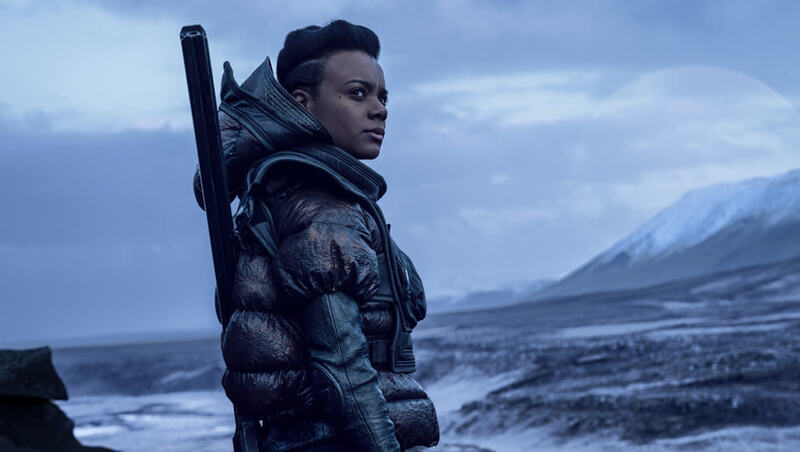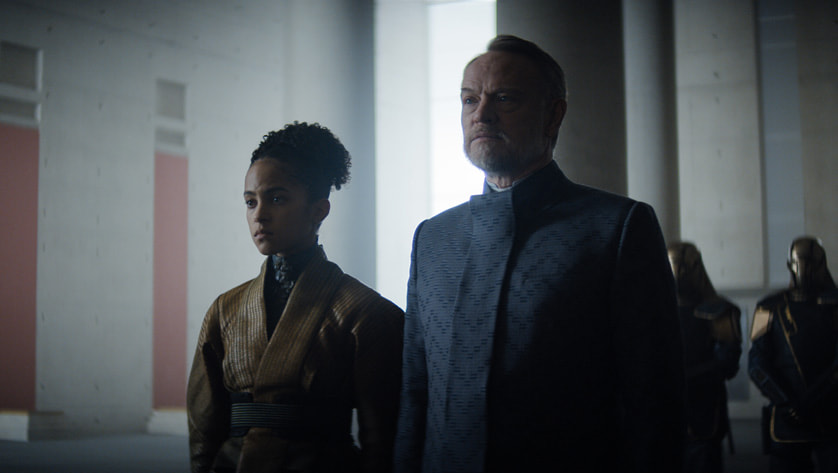AppleTV+’s “Foundation” is the type of sci-fi series that truly warrants being called an event. Based on a series of books by Isaac Asimov, it concerns nothing less than the story of a galactic civilization, thousands of years after ours, but still carrying on the patterns behind civilizations that rise and fall; the messiahs, the rulers, the intellectuals, the legends, the wars etc. “Foundation” expresses this massive scope through various emotional journeys, which have characters jumping from planet to planet, sometimes freezing themselves cryogenically to wake up many decades later, all in a story with an easily tangled timeline. The show is huge in numerous senses, and its world building is always impressive with its grandeur that’s both practical and also created with IMAX-worthy special effects. Its emotional expanse—its method to really get you to deeply feel for these many characters as their existence collapses—is a bit more of a question, but the show sucks you in a great deal.
Created by David S. Goyer and Josh Friedman, the epic focuses on the gradual collapse of the Galactic Empire. Jared Harris plays a mathematician genius named Hari Seldon who has figured out, using numbers and by studying history, that the empire that rules over everyone will collapse in 500 years (500 years is nothing in the scope of “Foundation”). Revealing this publicly gets him in a great deal of trouble, along with the people who work alongside him—his adoptive son assistant Raych (Alfred Enoch), and new prodigy Gaal Dornick (Lou Llobell), who came to study with Hari after leaving a water planet that looks down on intellectuals. This grand revelation is paralleled with a massive act of terrorism on the bustling planet of Trantor—the destruction of a space station that reaches miles high called The Starbridge, which crashes in the pilot episode like a gargantuan snake plopping flopping down on a metropolis, tearing a hole in the digital sky above. It’s a jaw-dropping sequence of destruction, one of many that shows how Apple TV+ is investing so much into the cinematic look of the series, and it ends with 100 million dead. The end is near.
Fearing more chaos by executing the man who makes these premonitions, the leaders of the empire (called the Cleons, but more on them later) decide to exile Hari, Gloria, and other brilliant mindss to a largely uninhabited, far away planet named Terminus. There, they will create Foundation, a type of learner’s guide for the next civilization to be able to rebuild without having to start completely from zero. Hari will lead the way, with logic and intellect as his guiding light. Instead of following the word of a god, he follows science. Hari becomes a type of messiah on the ship taking everyone to Terminus, and then the brief harmony is rocked by the end of episode two.
“Foundation” presents the major events of this downfall nearly disciple by disciple, and it doesn’t hesitate to splinter off with different side characters, or jump back and forth in time. Along with the story of Gloria, there’s the emotional journey of Salvor Hardin (Leah Harvey), a soldier and leader from Terminus, from a future timeline. She becomes instrumental in protecting the Foundation, along with her father (Clarke Peters) and mother (Jade Harrison), while having visions of what happened with Hari and Gaal.

Throughout these odysseys, in which the lack of actual work on Foundation makes this all feel like a ten-hour prologue, the story focuses the galaxy leaders of the Cleons. They are three male brothers, genetic copies of the original Cleon, but of different ages—the youthful Brother Dawn (played by Cassian Bilton in later episodes), the middle-aged Brother Day (Lee Pace), and the elderly Brother Dusk (Terrence Mann). The story puts a great deal of focus on these three as figureheads who rule over this empire, in particularly how Dawn begins to ponder his lacking individuality, or Day confronts the constructs of his power, and the truth behind his own existence. These sequences bring out some of the best practical sets of the series—the show loves formality, and loves to put on a ceremony—but they also have a harder time explaining how they’re vital to the story. Pace’s performance is magnetic, the way he carries himself among his people if he were about to sprout wings, but the idea of sympathizing with characters who embody so much about what kills civilizations, empires, countries, does not translate as well as the storytellers may think.
I will not get into too much specific detail about where the series goes after episode two (the first two episodes will be available for the premiere), but that “Foundation” creates a strong rhythm of being able to juggle so many different storylines, related to survival in different environments, whether it’s a mysterious vessel or shared turf with people from another planet who want to kill you. A regular episode can jerk you from Cleon existential dread to a battle between two feuding space races, and then also include a long solo journey in a spaceship (with a lot of self-reflection), while also flashing back and forth in time.
This is grandiose sci-fi with limits; it’s far better at engaging institutions behind the human condition during hushed conversations than it is raising the adrenaline with a fight sequence (mid-season scuffles clearly benefit from low lighting and choppy editing). The series gets stuck in an unusual spot—the episode one bombing proves to make the show feel front-loaded when it comes to action, and the life or death stakes get spread pretty thin as the show moves on, even though it also has the air of “don’t get too attached.” With all that’s going on, across different planets, the show doesn’t have the immediacy the end of the galaxy should have.

But “Foundation” is great at holding your attention through these dips with its promise of visual grandiosity. I found myself admiring flourishes like the intricate lighting of a space craft, the detailed mapping of a water planet we only see for a few select shots, or the show’s incredible costume design that gives specific texture to people from various planets who nonetheless still look human. It’s incredible what real locations they found for this series: the courtyards, the monuments, cavernous halls, and how they are dressed up to seem like they’re on another planet. The sets are massive and it makes a visceral difference when a setting is clearly only using green screen and special effects to enhance the work—“Foundation” is upheld by the visual magic we’re more used to praising expensive films for. Also, Bear McCreary’s score is essential and so effective in making certain story developments seem larger than life.
Texture also comes to mind when one thinks about the performances in this series. It offers a wide range, and that dynamic becomes one of its most interesting facets. Some actors, like Clarke Peters, are in the mix more for how they do not speak like they are in the future; but then there’s the scene-stealing Cleon servant Demerzel (Laura Birn), who hides her discomfort behind a regal poise in part because she’s a robot. Or Harvey’s performance, as she gives Salvor an almost computer-like directness in how her soldier speaks and rushes about, firing her monologues with an urgency as the galaxy’s problems go more and more on her shoulders. And Jared Harris is captivating and regal as the series’ greatest symbol, affable, knowing, mysterious. All of these pieces performances fit in the story, and help create its tapestry.
One of the best features about “Foundation” is actually that it’s not for everyone—it’s fairly set in its pacing that favors heady, dense character-building, and it’s built on the notion that subscribers are hungry to enter new sci-fi worlds not just for the action (because they’ll come up short here, certainly). In spite of its sporadic shortcomings, the ambition of the series is exciting itself. If it finds the audience that it was made for, “Foundation” could very well become another landmark series for Apple TV+.
All of season one screened for review. The first two episodes of “Foundation” premiere on September 24 on Apple TV+.












